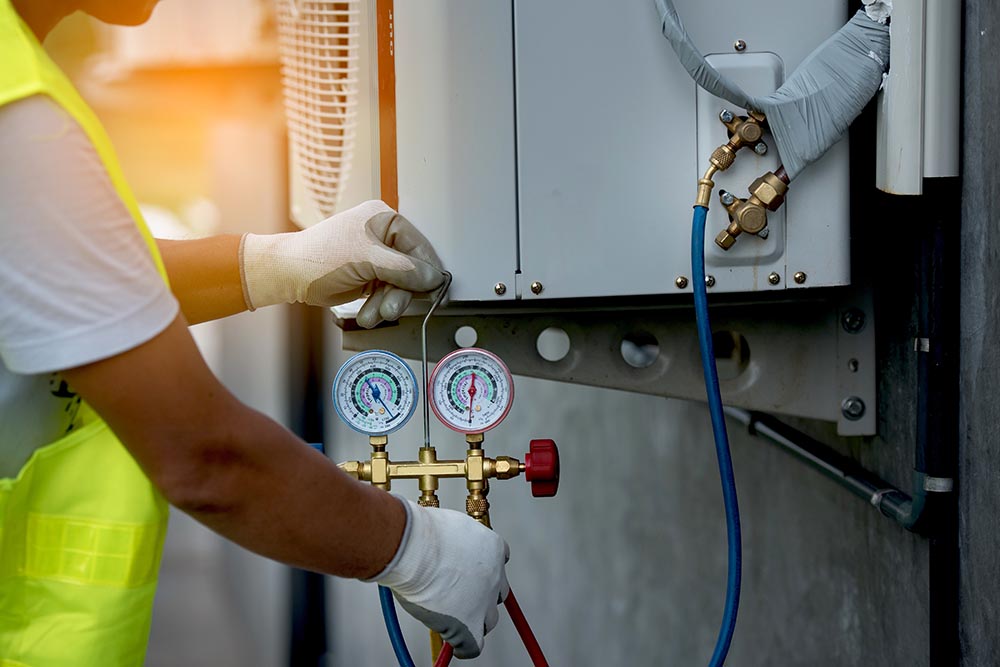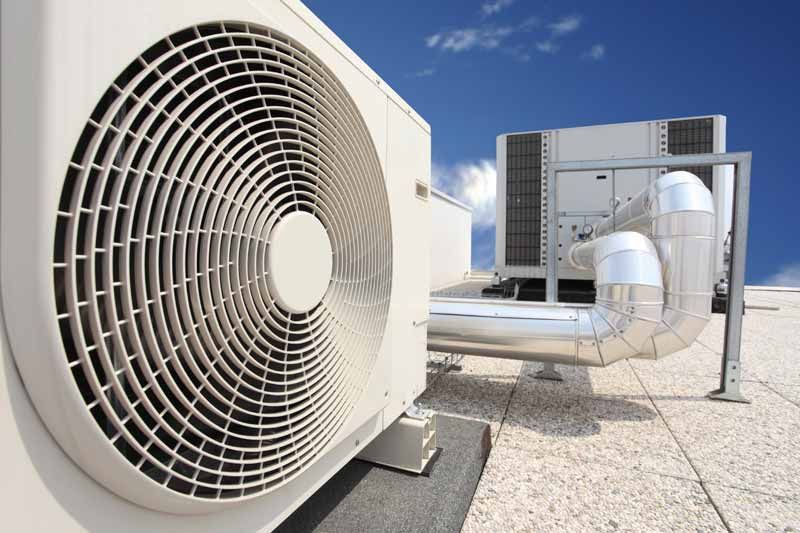Selecting In Between a Heatpump and Heating System: Secret Factors To Consider for Your Heating And Cooling Requirements
When reviewing home heating alternatives for cooling and heating requires, the choice in between a heatpump and a furnace can be complex. Each system provides distinct advantages customized to certain environments and power performance objectives. Recognizing these distinctions is necessary for making an enlightened option. Secret aspects such as setup expenses and environmental impact further make complex the option procedure. Which alternative absolutely lines up with one's comfort and sustainability preferences? The adhering to areas will explore these factors to consider in information.
Recognizing Warmth Pumps: Just How They Work and Their Benefits
While several home owners consider numerous home heating options, understanding just how heatpump feature and their benefits can substantially influence their decision. Heatpump operate by moving heat instead than generating it. In the winter season, they remove heat from the outside air or ground and move it inside your home, while in the summer, they reverse this procedure, cooling the home by expelling warm outside. This dual capability makes them flexible for year-round environment control.One of the main advantages of warmth pumps is their energy performance. They utilize significantly much less electrical power compared to typical heater, possibly leading to reduced utility costs (heat pump service). Additionally, heatpump have a smaller carbon impact, making them an environmentally friendly selection. They also call for less maintenance than traditional systems, contributing to long-lasting price financial savings. On the whole, comprehending the technicians and benefits of warm pumps can help homeowners make notified decisions concerning their heating and cooling down requirements
Checking Out Heaters: Kinds, Procedure, and Advantages
Furnaces come in various types, including gas, electrical, and oil models, each with distinctive functional mechanisms. Understanding these differences is necessary, as they affect efficiency and heating performance. Furthermore, furnaces offer numerous benefits, such as constant warmth outcome and reliability in chillier environments.
Kinds of Furnaces
Furnace can differ substantially in design and operation, with heating systems being a prominent selection amongst homeowners. There are a number of kinds of heaters, each using various gas sources and technologies. Gas heaters are typical, leveraging gas to produce warm successfully. Electric furnaces, on the various other hand, use electrical resistance to generate heat, frequently preferred for their uncomplicated installment. Oil heating systems, while much less typical, are effective in locations with limited gas accessibility (heat pump service). In addition, condensing heaters maximize power effectiveness by recording and recycling exhaust gases. Each kind runs via a system of heat exchangers and ductwork to distribute warm air throughout a home. Understanding the distinctions in between these furnace types is crucial for informed a/c decisions
Benefits of Heating systems
For property owners seeking trusted warmth throughout cool months, the advantages of heaters are significant. Heaters give regular home heating, ensuring even temperature levels throughout the home. They are specifically reliable in extreme cool, typically outmatching heat pumps in frigid conditions. Numerous kinds, consisting of gas, electric, and oil heating systems, supply versatility to fulfill diverse requirements and preferences.Furnaces likewise tend to have lower initial setup costs compared to warmth pumps, making them an extra available alternative for numerous. Their robust style adds to a longer life expectancy, with many systems lasting over 15 years with correct upkeep. In addition, contemporary heaters are usually equipped with sophisticated innovation for improved effectiveness, which can cause minimized energy costs. Overall, heating systems remain a trustworthy option for effective home heating.

Power Effectiveness: Comparing Warm Pumps and Furnaces
When contrasting power performance in between heatpump and heating systems, the Seasonal Energy Performance Proportion (SEER) plays an important duty in determining efficiency. In addition, an operational cost analysis exposes the long-lasting financial ramifications of each system. Comprehending these factors can assist homeowners in making notified choices regarding their home heating remedies.
Seasonal Energy Performance Ratio
Power effectiveness plays a crucial role in the decision-making procedure between heat pumps and heating systems, especially when considering the Seasonal Power Efficiency Proportion (SEER) This metric actions the cooling efficiency of heatpump over an entire air conditioning season, supplying a standardized way to assess performance. Higher SEER scores indicate greater power efficiency, converting to lower power usage and lowered energy expenses. On the other hand, furnaces are normally analyzed using the Yearly Gas Application Performance (AFUE) rating, which mirrors heating effectiveness. When contrasting these two systems, homeowners must prioritize SEER rankings for heatpump, as they directly impact overall energy financial savings and ecological sustainability. A complete understanding of SEER can notably influence the long-term fulfillment and cost-effectiveness of the selected a/c remedy.
Functional Price Analysis
Understanding the functional costs related to warmth pumps and furnaces is crucial for property owners evaluating their choices. Heatpump usually provide higher energy efficiency, converting electrical energy right into warmth with very little waste. This causes reduced month-to-month utility costs, especially in modest environments. Conversely, standard heating systems, particularly gas models, might have reduced ahead of time expenses but can sustain greater operational expenses over time because of fuel rates and efficiency ratings.Moreover, heat pumps can operate as both heating and cooling down systems, potentially decreasing the demand for separate HVAC units. While initial investments for warmth pumps may be greater, their long-term financial savings in power efficiency can make them a more economical choice for many families. Cautious evaluation of regional energy rates is crucial to figure out the most get redirected here effective option.
Setup Costs: What to Anticipate for every Furnace
Installment expenses for furnace can vary substantially between heatpump and heating systems, influencing property owners' choices. Warm pumps typically have greater ahead of time setup prices, normally varying from $3,500 to $8,000, depending on the system dimension and complexity of setup. This consists of the exterior system, indoor handling system, and required ductwork alterations. On the other hand, heating systems have a tendency to have lower first prices, averaging between $2,500 and $6,000, which can be appealing for budget-conscious house owners. Installment expenditures can raise if comprehensive ductwork is required.Moreover, the choice of gas type for heating systems-- natural gas, gas, or electrical-- can additionally influence setup expenses. While warm pumps offer energy performance, their first investment might hinder some purchasers. Ultimately, reviewing installment prices along with lasting financial savings and performance will help house owners in making notified decisions regarding their heating systems.
Environment Factors To Consider: Which System Executes Better in Your Location
Exactly how do climate problems affect the performance of furnace? The performance of heatpump and heaters can vary significantly depending upon the neighborhood climate. In moderate environments, warm pumps stand out by successfully moving warm from the outside air, making them an energy-saving option. Nonetheless, their effectiveness decreases in extremely cool temperatures, where they may struggle to remove adequate warmth. Alternatively, heating systems, specifically gas models, provide reputable and constant warmth no matter exterior problems, making them more suitable in cooler regions.In areas that experience milder winters months, warm pumps can operate effectively year-round, giving both heating and air conditioning. On the other hand, areas with harsh winters frequently take advantage of the robustness of furnaces. Eventually, comprehending the local climate is crucial when determining in between a heatpump and a heater, as it directly affects their operational performance and overall efficiency.
Upkeep Demands: Long-Term Take Care Of Warm Pumps vs. Furnaces
While both heatpump and heaters require routine upkeep to guarantee peak efficiency, their particular demands and treatment regimens vary substantially. Heating systems normally require much less regular interest, with annual examinations being enough to look for gas leaks, tidy filters, and examine total functionality. Their easier layout typically enables for straightforward repairs.In contrast, heatpump demand semiannual maintenance because of their double duty in heating and cooling. This includes cleaning coils, inspecting cooling agent levels, and making certain that both the outdoor and interior units operate at their finest. Furthermore, heatpump upkeep frequently includes even more intricate components, making professional servicing essential.Neglecting maintenance can result in decreased effectiveness and boosted power prices for both systems. Ultimately, home owners ought to think about these long-lasting care demands when selecting in between a heatpump and a furnace, as proactive upkeep can expand the lifespan and efficiency of either system substantially.
Ecological Influence: Picking a Sustainable Home Heating Option
The ecological impact of heating unit is a crucial assessment for house owners looking for sustainable alternatives. Heatpump are generally more energy-efficient than standard heating systems, as they move heat instead than create it, substantially reducing carbon discharges. By utilizing renewable energy sources, such as air-source or geothermal heatpump, property owners can further minimize their eco-friendly footprint.On the various other hand, all-natural gas heating systems send out greenhouse gases and add to air pollution, though they commonly supply higher warm outcome. Nevertheless, innovations in modern technology have caused the advancement of high-efficiency furnaces that reduce emissions.Ultimately, picking a heating unit involves weighing performance against ecological effect. House owners are encouraged to review neighborhood energy sources and incentives for sustainable systems, guaranteeing a choice that lines up with both personal convenience and environmental duty. The choice influences not only prompt convenience yet likewise long-lasting sustainability and ecological health.
Frequently Asked Questions
For How Long Do Warm Pumps and Furnaces Commonly Last?
The life-span of heatpump generally varies from 15 to two decades, while furnaces can last between 15 to three decades. Routine maintenance significantly impacts their longevity and effectiveness in supplying home heating remedies.
Can I Use a Heatpump in Incredibly Cold Climates?
Heatpump can operate in incredibly cool environments, however their performance lessens as temperature levels drop. In such conditions, supplemental heating sources may be required to preserve comfy interior temperature levels and ensure peak reference efficiency.

What Is the Sound Level of Warm Pumps Versus Furnaces?
The noise levels of heat pumps and heating systems differ substantially. Normally, warmth pumps run even more silently than traditional heating systems, making them more suitable for those sensitive to appear, while heaters might produce louder functional sounds during heating cycles.
Are Warmth Pumps Suitable for Both Heating & Cooling?
Heatpump are indeed appropriate for both heating & cooling (furnace replacement). They work by transferring warmth, supplying efficient temperature control year-round, making them a flexible choice for property owners looking for an all-in-one a/c remedy
What Dimension Home Heating System Do I Need for My Home?
Determining the suitable dimension heating unit for a home calls for assessing aspects such as square video, insulation high quality, local environment, and the home's format. Consulting a best site specialist can guarantee an accurate assessment and excellent convenience. Warm pumps typically provide greater energy efficiency, transforming electrical power right into warmth with minimal waste. In modest environments, warmth pumps excel by efficiently transferring warm from the outdoors air, making them an energy-saving alternative. Conversely, furnaces, especially gas versions, provide trustworthy and regular warm no matter of outside problems, making them more effective in cooler regions.In locations that experience milder winters months, warmth pumps can run properly year-round, giving both home heating and air conditioning. Warmth pumps are typically much more energy-efficient than standard heaters, as they transfer heat instead than create it, substantially reducing carbon exhausts. By making use of eco-friendly power sources, such as geothermal or air-source heat pumps, homeowners can even more lessen their eco-friendly footprint.On the other hand, natural gas furnaces produce greenhouse gases and contribute to air pollution, though they often provide greater warm outcome.
Comments on “Get the Best Results from Your heat pump installation ooltewah tn”